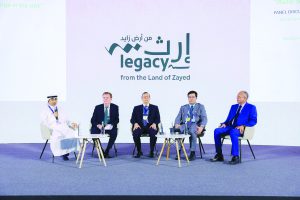DUBAI/ WAM
The UAE University (UAEU) hosted a seminar titled “Water Security under Climate Change Conditions in the UAE: Challenges and Opportunities” in cooperation with Trends Research Advisory at COP28 in Expo Dubai.
Dr. Muhammad Al-Ali, CEO of Trends Research Advisory, lauded the productive partnership between the two institutions, highlighting their commitment to scientific research collaborations. He emphasised the importance of utilising a rational scientific approach to disseminate knowledge and address the challenges facing various communities and nations.
He further emphasised the effectiveness of scientific cooperation by pointing to the launch of a joint report on water security with the UAEU and the joint symposium held during COP28. He believes these initiatives demonstrate the power of collaboration in tackling current issues and paving the path for a sustainable future.
Dr. Al-Ali highlighted the report’s focus on water security, a crucial issue on the COP28 agenda. He emphasised its connection to food security and sustainable food systems, stressing the necessity of unified efforts from all relevant authorities, including research and academic institutions, to achieve water security.
He expressed optimism for the future, stating that the successful collaboration between Trends Research Advisory and the UAEU will be further strengthened, demonstrating its effectiveness in addressing water security challenges.
Prof. Ahmed Murad, Associate Provost for Research at UAEU, highlighted the importance of the strategic partnership with TRENDS Research Advisory. This collaboration, he noted, enhances scientific research output and underscores the global significance of water security as a challenge requiring scientific solutions.
Murad emphasised the forward-thinking nature of their water security study in the UAE, analysing the multifaceted impacts of climate change on water resources. The study anticipates rising temperatures, leading to increased evaporation and plant transpiration. It also predicts changes in rainfall patterns, including more severe droughts and sudden rainstorms, impacting groundwater recharge. Additionally, rising sea levels pose potential risks of shoreline shifts and coastal groundwater salinization.
Murad highlighted the expansion of non-traditional water sources as a key strategy for bridging the gap between demand and supply. He emphasized the UAE’s proactive approach through utilizing renewable energy and maximising the use of treated wastewater. These measures help mitigate future climate change impacts on water resources and maintain a sustainable balance.
The seminar concluded with a panel discussion in which Dr. Dalal Al Shamsi, Dr. Serhat Çobükçoglu, Dr. Mohsen Sharif, Dr. Abdulazim Ibrahim, and Dr. Ahmed Saif Al-Nasr participated.
 The Gulf Time Newspaper One of the finest business newspapers in the UAE brought to you by our professional writers and editors.
The Gulf Time Newspaper One of the finest business newspapers in the UAE brought to you by our professional writers and editors.
